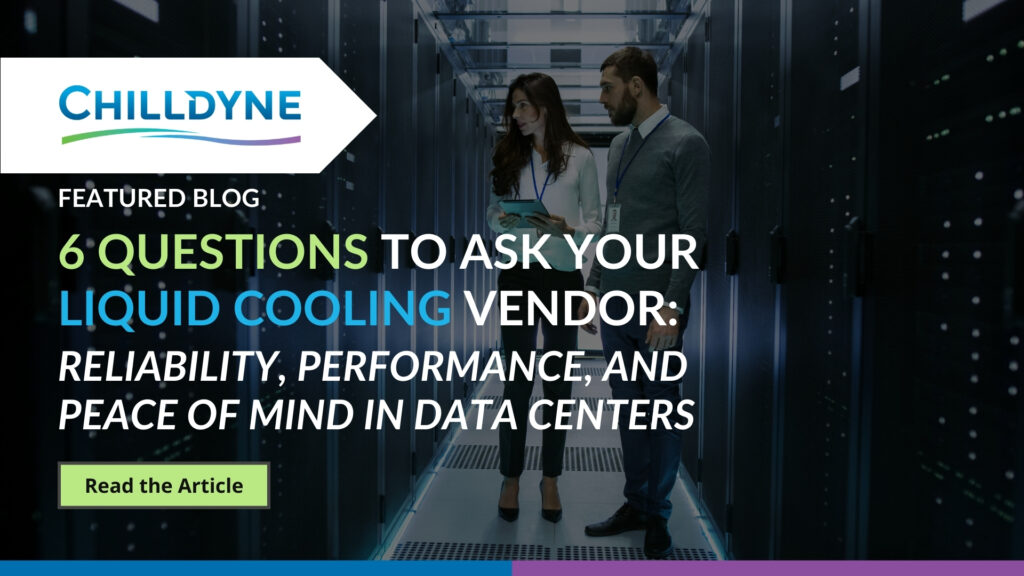6 Questions to Ask Your Liquid Cooling Vendor: Reliability, Performance, and Peace of Mind in Data Centers
Selecting the right liquid cooling solution is paramount for optimal data center operations. It's not just about providing the best cooling efficiency; it's about ensuring reliability, performance, and peace of mind.
Here are six essential questions you should ask your liquid cooling vendor to ensure you choose a system that effectively meets your data center's needs.
- What level of uptime can I expect with this liquid cooling system, and how is it calculated?
Uptime is critical because any interruption in a liquid cooling system may lead to immediate downtime (within a minute). Ask your vendor about the expected uptime level—99.999% cooling availability is necessary. Understand how they calculate this figure and what measures are in place to maintain this level of reliability. Liquid cooling must be more reliable than air cooling because the "ride-through" time is much shorter.
- Who warranties the server in case of damage from leaks?
Determining who is responsible for the costs associated with damage caused by the cooling system is vital. Ideally, the liquid cooling vendor should cover repairs if their system leaks. This provides peace of mind and underscores the vendor's confidence in their leak-proof systems.
- How much experience do you have with this particular type of liquid cooling system that you are offering?
The vendor's experience is an indicator of system reliability, as they will have encountered and resolved various challenges over time. Please inquire about the number of servers they have successfully deployed with their direct-to-chip liquid cooling system and the duration of those installations. Since liquid cooling system issues may take time to manifest, choose a vendor with a proven track record of several years of cooling at least hundreds of servers. This depth of experience allows the vendor to anticipate potential problems and proactively implement solutions, ensuring a more reliable and efficient system for your data center.
- At what temperature will my CPUs operate after four (4) years?
Inquire about the expected CPU temperatures after several years. A good vendor should be able to provide an estimated maximum temperature of at least 15°C below the throttling temperature, considering the degradation of thermal grease over time.
- How much heat will need to be removed with supplemental air cooling?
Even with a liquid cooling system in place, some heat may still need to be removed by air cooling. For example, a 70-kW liquid-cooled rack may require a rear door heat exchanger to remove the remaining air heat. Understanding the balance between liquid and air cooling is fundamental for proper data center planning and management. Ask your vendor to provide a clear breakdown of the expected heat removal distribution, as this will help you evaluate the total cooling efficiency and identify any additional infrastructure requirements. This may require testing the server under load.
- How is the coolant quality maintained?
Why it matters: Poor coolant quality can lead to corrosion, contamination, and system failures. A responsible vendor should have robust processes in place to maintain coolant quality, including regular monitoring, filtration, and treatment. Chilldyne employs an Automated Coolant Quality (ACQ) system, which ensures high coolant quality, actively prevents corrosion and biogrowth, and supports optimal thermal performance. Inquire about how the vendor maintains coolant quality and what specific technologies or methodologies they use.
By examining potential liquid cooling vendors using these six questions, you position yourself to choose a partner that delivers reliable, high-performance, and cost-effective solutions. Opt for a vendor who provides satisfactory answers, demonstrates thorough knowledge, employs a proactive approach, and demonstrates a commitment to your data center's long-term success. With the right liquid cooling system and vendor support, you can confidently manage the operational and thermal demands of your high-density data center while ensuring optimal performance and peace of mind.

